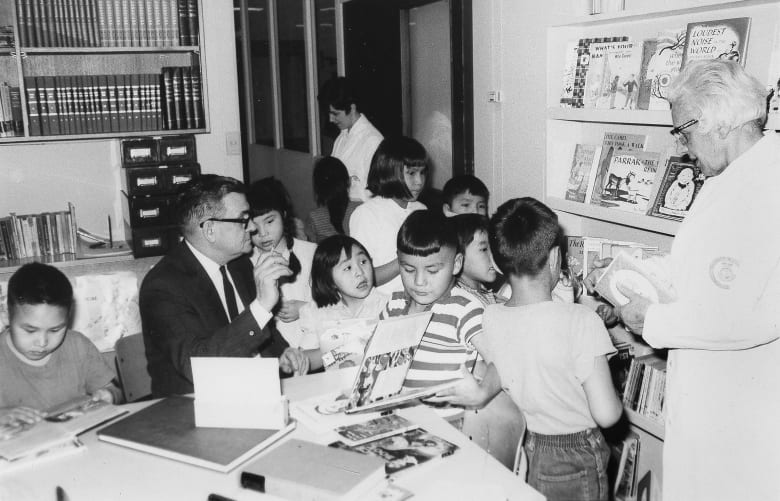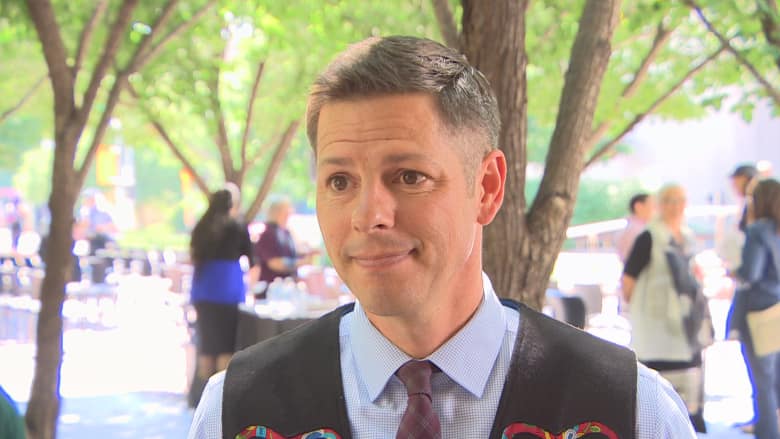[ad_1]
A Manitoba association created by the agency that once ran segregated “Indian hospitals” in the province is among more than 40 new signatories to Winnipeg’s Indigenous accord.
“It’s very important for us. It’s part of our reconciliation process,” said Neil Johnston, president of the Manitoba Lung Association.
“We want to re-establish a really good, solid working relationship with Indigenous people.”
The Lung Association was among dozens of Winnipeg-based groups that added their names to the city’s year-old Indigenous Accord on Wednesday morning. Other groups include the Royal Winnipeg Ballet, CentrePort Canada, Investors Group, the Manitoba Museum and the Manitoba College of Social Workers.
The accord was first signed by more than 80 groups last March. Signing on means committing to an ongoing responsibility to reconciliation, the city says. Signatories are required to report yearly on the success of their efforts and their future goals.
For the Lung Association, it also means addressing a legacy of segregation, substandard care and allegations of mistreatment at the hands of tuberculosis doctors from Indigenous patients, Johnston said.
“We want to make sure that that … never happens again, and we want to help in the healing of people who have survived that care but also the families and make up for the intergenerational trauma that occurred,” he said.
The Lung Association was established in 1975 by Manitoba’s Sanatorium Board, originally created by the province in the Sanatorium Board of Manitoba Act of 1904.
The board was tasked with overseeing provincial care for tuberculosis, a respiratory illness that was widespread at the time. Under that mandate, it established a number of racially segregated “Indian hospitals” in the province.
Survivors of those hospitals in Manitoba and across Canada have shared widespread allegations of mistreatment and abuse, including reports of medical experimentation from a Manitoba patient. In January, two Canadian law firms filed a $1.1-billion class-action lawsuit on behalf of former patients.
In Manitoba, the “Indian hospital” experience and the tuberculosis experience were often one and the same, Johnston said.
“The Lung Association has over a 100-year legacy, which includes managing the care and treatment of all Manitobans and Indigenous people. But unfortunately, under the Sanatorium Board’s care, there was a lot of issues regarding the standard of care, which we’re really, really unhappy and really saddened to hear that that happened,” Johnston said.

A teacher with students during the 1960s at the Charles Camsell Indian Hospital in Edmonton, Alta., one of 29 facilities named in a class-action lawsuit filed on behalf of former patients at racially segregated hospitals. (Alberta Provincial Archives)
“Going forward, we want to reconcile the substandard quality of care that occurred and we want to walk together with Indigenous people so that they, as well as all Manitobans, can breathe with ease.”
The association is committing to working toward health-related calls to action outlined by the Truth and Reconciliation Commission, Johnston said. By signing the accord, he said the group will be held accountable to following through on a plan it will lay out to achieve that.
So far, Johnston said its goals include examining and establishing the association’s own history, and speaking to people who experienced the hospitals themselves. From there, the association will work with Indigenous community members to form a plan for reconciliation and improved health outcomes.
“We want to make sure that all of our actions going forward relate to a balanced approach, making sure Indigenous people aren’t treated any differently,” he said.
‘Aspirational document’
Winnipeg Mayor Brian Bowman urged more organizations to sign on, calling the accord an “aspirational document” and an ongoing effort.
He couldn’t say to what extent the city has followed up with organizations to verify their self-reported progress.

Winnipeg Mayor Brian Bowman said the accord is an aspirational document and an ongoing effort. (Walther Bernal/CBC)
“The City of Winnipeg isn’t the judge of the quality of the actions by individual organizations,” he said.
“But we have created a website in which organizations can submit their outcomes on an annual basis and report on what they’re going to work on, and that’s shared publicly so there can be that learning within the community.”
The city provided a full list of new signatories on Wednesday, which includes:
- CentrePort Canada.
- Balmoral Hall School.
- Mex Y Can Association of Manitoba.
- Manitoba Northwestern Ontario Synod – Evangelical Lutheran Church in Canada.
- Creative Manitoba.
- Building Urban Industries for Local Development (BUILD) Inc.
- Sarasvati Productions.
- Winnipeg Boldness Project.
- Solara Remote Data Delivery Inc.
- Mennonite Central Committee Manitoba.
- Infinyt Development Group.
- Manitoba College of Social Workers.
- Youth1st Lacrosse.
- North End Community Renewal Corporation.
- Frontier College.
- Returning to Spirit – Reconciliation Workshops.
- Immigration Partnership Winnipeg.
- FASD Life’s Journey Inc.
- ft3 Architecture Landscape Interior Design.
- Investors Group.
- Richard Craig (individual).
- Running Deer Resources.
- End Homelessness Winnipeg.
- Inspire Community Outreach.
- Seed Winnipeg.
- Jessica Dumas Coaching & Training.
- Immigrant and Refugee Community Organization of Manitoba.
- World Trade Centre Winnipeg.
- Mennonite Church Manitoba.
- Lindsay Somers Lifestyle Health.
- The Lung Association, Manitoba.
- Gonzaga Middle School.
- Royal Winnipeg Ballet.
- Elder Lucy Guiboche.
- The Manitoba Museum.
- The North West Company.
- James Allum, MLA for Fort Garry-Riverview.
- Rob Altemeyer, MLA for Wolseley.
- Nahanni Fontaine, MLA for St. Johns.
- Bernadette Smith, MLA for Point Douglas.
- Matt Wiebe, MLA for Concordia.
- Social Planning Council.
- Chief Dennis Meeches, Long Plain First Nation.
- Chief Lance Roulette, Sandy Bay Ojibway First Nation.
[ad_2]



